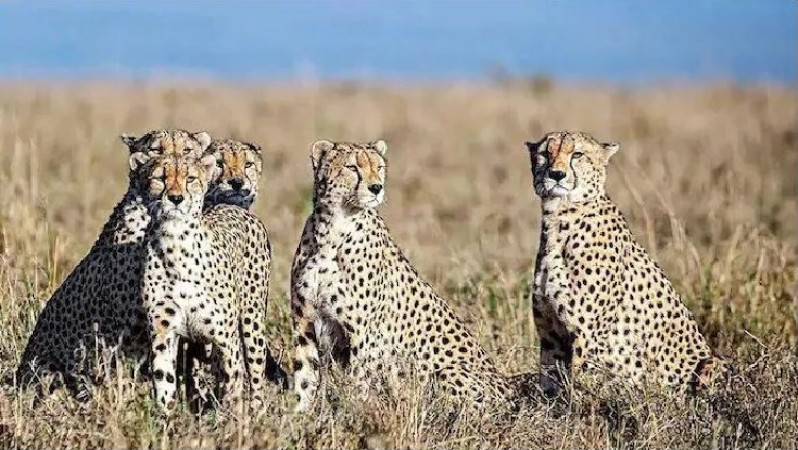
South Africa: Wildlife experts have reported that a dozen cheetahs that have been held in quarantine in South Africa for more than four months have lost fitness while waiting to be flown to Madhya Pradesh's Kuno National Park (KNP), as a formal signing of an agreement is delaying their intercontinental translocation.
These big cats, who will join the eight cheetahs imported from Namibia and released in KNP in Sheopur district in mid-September, are claimed to be suffering from the effects of protracted quarantine.
Wildlife specialists who are aware of India's cheetah restoration strategy claimed that the 12 South African cheetahs--seven males and five females-- have actually never hunted for themselves even once since being housed in bomas (small enclosures).
Pretoria has failed to sign a memorandum of understanding (MoU) with the Indian government for the transfer of the spotted cats to KNP, despite recent progress in Project Cheetah execution with South Africa.
Since July 15, nine have been housed in Rooiberg Quarantine Boma in Limpopo Province and three have been held in Phinda Quarantine Boma in KwaZulu-Natal Province.
They have lost considerable fitness since they have not hunted even once since July 15, one of the experts reportedly said. He added that a running animal has toned up muscles and improved fitness, suggesting they may have gained weight similarly to humans who are sedentary.
When questioned about the delay in signing an MoU, the expert stated that the Indian proposal on cheetah translocation was approved last week by South African Minister of Environment, Forestry, and Fisheries Barbara Creecy. The idea will now be approved by the president of South Africa in order for a formal agreement to be made between the two nations, he said.
Another expert said that a South African group went to KNP in early September to inspect how the wildlife sanctuary had set up homes for the fastest land mammals on the planet.
"The project is moving forward, although the MoU has not yet been signed. The delegation was happy with the accommodations at KNP. The second analyst predicted that the MoU between New Delhi and Pretoria would be signed this month.
Principal Chief Conservator of Forest (Wildlife) J S Chauhan of Madhya Pradesh stated that they are prepared to receive South African cheetahs when called.
Ajay Dubey, a wildlife specialist and the founder-secretary of Prayatna, an NGO dedicated to tiger protection, expressed concern about the South African cheetahs' physical condition given that they will have to keep an eye out for strong leopards in the KNP when they travel to India.
Officials from the forest department estimated that there were 70 to 80 leopards in KNP, which covers 1,200 square km in total, including the buffer zone.
Cheetahs from South Africa that are moving to India were raised around leopards. Wildlife experts claimed that they are aware of how to avoid them.
On September 17, the 72nd birthday of Prime Minister Narendra Modi, eight cheetahs that had been brought in from Namibia into KNP were released amid great fanfare, beginning the process of restoring their population in India, where these brilliantly spotted cats went extinct seven decades earlier.
Before being fully released into the wild, these Namibian wild animals (five females and three males)are currently in hunting enclosures at the park.
The cheetahs selected by Indian officials for translocation had spent a month in quarantine as of July, but they continued that without South African government consent, they could not be transported to KNP.
The experts said, the Indian government was unable to bring the eight Namibian cheetahs to KNP around Independence Day since they had not finished their quarantine period.
As per Indian wildlife legislation, animals must undergo a 30-day isolation period when they arrive in the nation, in addition to a one-month quarantine before being imported.
The metapopulation of spotted animals in South Africa has increased from 217 cheetahs in 2011 to 504 now, according to specialists.
The big cat species was officially declared extinct in 1952 after the death of the last cheetah in India in the Koriya area of modern-day Chhattisgarh in 1947.
Under the United Progressive Alliance (UPA) administration, former Union Environment Minister Jairam Ramesh launched "Project Cheetah" in 2009 with the intention of reintroducing wild cats to India.
Read MOre INternational news: